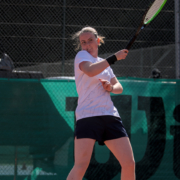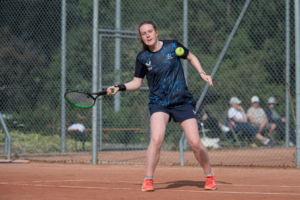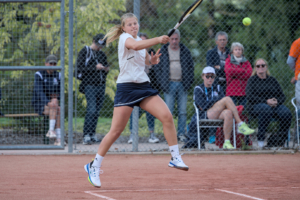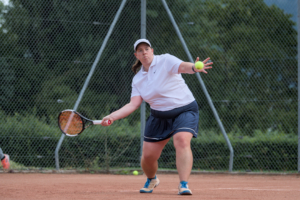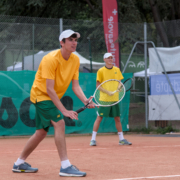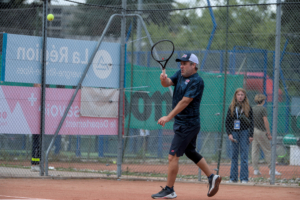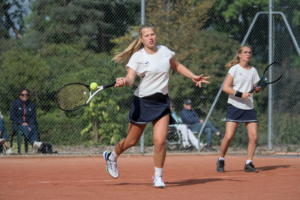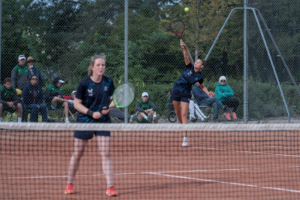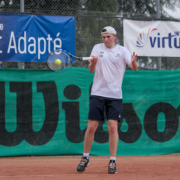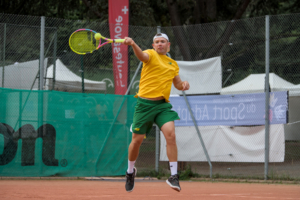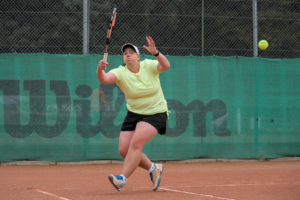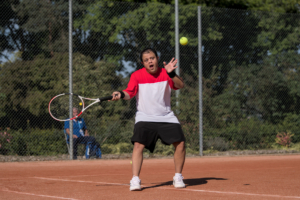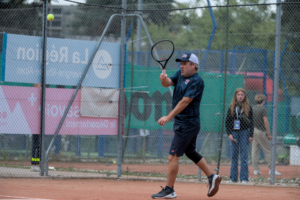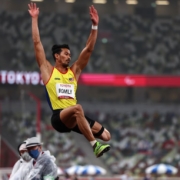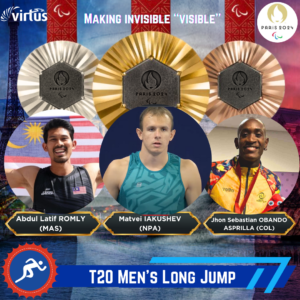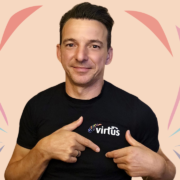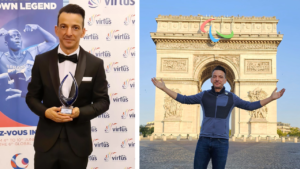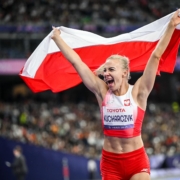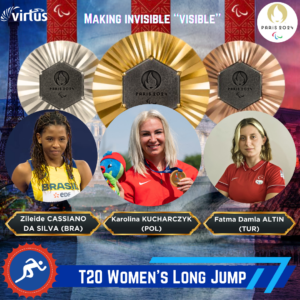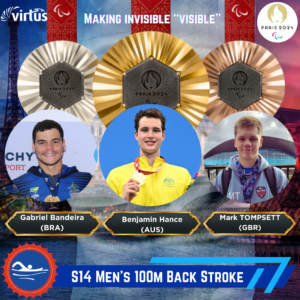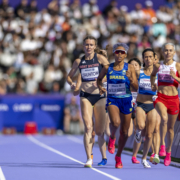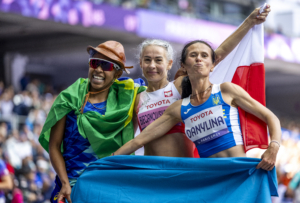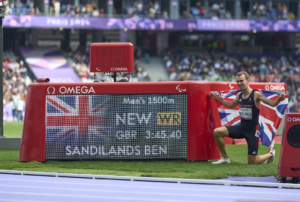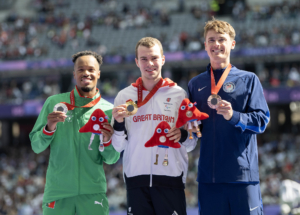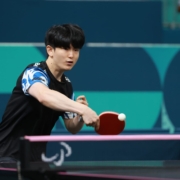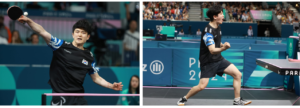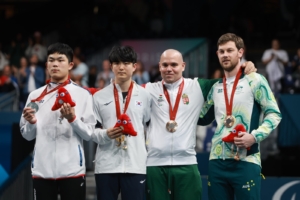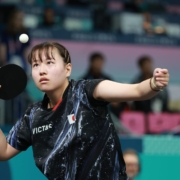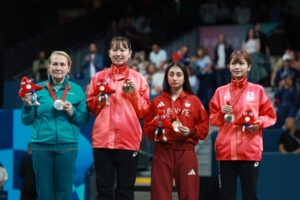Thunderous Performances by Athletes with Intellectual Impairment at Paris 2024
The Paris 2024 Paralympic Games will be remembered for the incredible feats of 157 athletes from 43 countries who competed in Athletics, Swimming, and Table Tennis. For many, it was their first Paralympic Games, and they took full advantage of the opportunity to shine. These athletes, who are often overlooked, made history, broke world records and inspired millions around the globe.
New World and Paralympic Records
Athletics
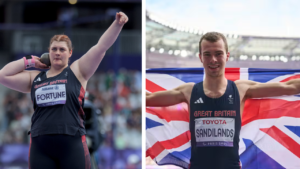
Sabrina Forrune (L) and Ben Sandilands (R) at Paris 2024. Photo Credit Pralaympcs GB.
1. Sabrina Fortune (GBR): Sabrina broke the World Record in the F20 Women’s Shot Put with a massive throw of 15.12m, earning her a gold medal. She had also claimed gold at Kobe 2024 and silver at Rio 2016.
2. Ben Sandilands (GBR): In a breathtaking performance, Paralympics debutant Ben Sandilands from Great Britain shattered the World Record in the T20 Men’s 1500m with a time of 3:45.40.
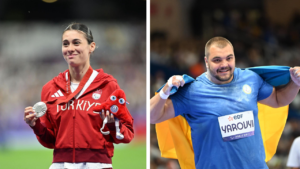
Aysel Onder (L) and Oleksandr Yarovyi (R) celebrating their victory at Paris 2024. Photo Credit: TOSSFED and NPC Ukraine.
3. Aysel Onder (TUR): In the T20 Women’s 400m semifinals, Aysel broke the World Record with a time of 54.96s, securing her spot in the finals. Aysel claimed the silver in the finals, losing the gold by an inch to the Ukrainian, Yullia Shulliar.
4. Oleksandr Yarovyi (UKR): Oleksandr obliterated the F20 Men’s Shot Put World Record twice, finishing with a gold-medal-winning throw of 17.61m.
Swimming
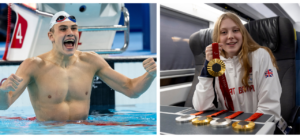
Alexander Hillhouse (L) and Poppy Maskill (R) celebrating their win. Photo Credit: OIS photos and Paralympics GB
1. Alexander Hillhouse (DEN): Newbie Alexander broke the Paralympic record in the S14 Men’s 100m Freestyle with a time of 54.61 sec.
2. Poppy Maskill (GBR): Nineteen-year-old Poppy set a new World Record in the S14 Women’s 100m Butterfly, clocking an impressive 1:03.00. Poppy Maskill took five medals, three gold and two silver from her first Paralympic Games.
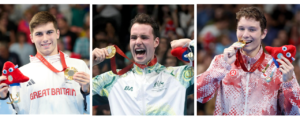
William Ellard, Benjamin Hance and Nicholas Bennett posing with their gold medals (L-R). Photo Credit: Paralympics GB, Swimming Australia and NPC Canada.
3. William Ellards (GBR): William broke the World Record in the S14 Men’s 200m Freestyle with a time of 1:51.30. He also won a gold in the 4x100m Mixed Freestyle relay and a silver in the S14 100m Butterfly. William was also competing in his first Paralympic Games at Paris 2024.
4. Benjamin Hance (AUS): Benjamin rewrote history in the pool, setting a new World Record in the S14 100m Backstroke with 56.52 sec. He also too silver in the S14 4x100m Mixed relay.
5. Nicholas Bennett (CAN): Nicholas set a new Paralympic Record in the SM14 200m Individual Medley, finishing at 2:06.05. Bennett also claimed Canada’s first Gold medal at Paris 2024 and added a second gold from the S14 Men’s 100m Breaststroke and silver from the S14 200m Freestyle.
Historical Achievements
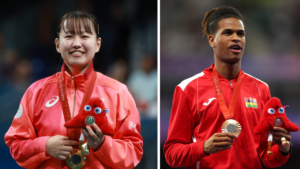
Wada Natsuki (R) and Yovanni Philippe (L) flaunting their historical medals. Photo Credit: ITTF and WPA
1. Wada Natsuki (JPN): In a historic moment, Wada became the first Japanese woman to win a Paralympic gold medal in Para Table Tennis, competing in the Class 11 Singles at Paris 2024. She made history not just by winning her first Paralympic medal from her first Paralympic games, but by becoming a trailblazer for her country.
2. Yovanni Philippe (MRI): Yovanni made history for Mauritius, winning a bronze medal in the men’s 400m T20 event—marking the nation’s first-ever Paralympic medal podium finish. Yovanni too was making Paralympic Games debut at Paris 2024.
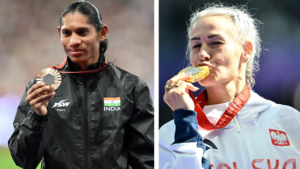
Deepthi Jeevanji (L) and Barabara (R) showing off their bronze and gold medals respectively. Photo Credit: NPC India and NPC Portugal.
3. Deepthi Jeevanji (IND): Deepthi, the silver medalist from the 2023 Virtus Global Games, became the first Indian athlete with an intellectual impairment to win a Paralympic medal. Her time of 55.82 seconds in the T20 Women’s 400m earned her a historic bronze medal.
4. Barbara Bieganowska-Zając (POL): Barbara becomes the first athlete with an intellectual impairment to win five Paralympic Gold medals from five Paralympic Games editions.
Lenine Cunha elected to join IPC Athlete’s Council
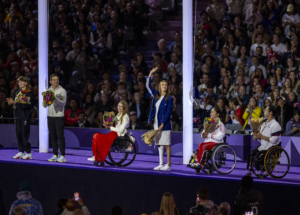
Lenine Cunha (second from left) with other newly elected members of The IPC Athletes Council during the Closing Ceremony at the Stade de France at the Paris 2024 Paralympic Games, Paris, France. Photo Credit: OIS/Lillie Yazdi.
Virtus Ambassador, Lenine Cunha, made headlines by becoming the first athlete with an intellectual impairment to be elected to the IPC Athletes’ Council. With 353 votes, Lenine ranked first among all candidates. Reflecting on his achievement, he said,
“The athletes’ voice embodies sports’ heart and soul… I aim to amplify the voices of athletes with intellectual impairments.“
These athletes have proven that athletes with intellectual impairments can compete at the highest levels and achieve extraordinary things. The #MakingInvisibleVISIBLE campaign is more relevant than ever, as these performances underscore the need to celebrate and recognize the abilities of athletes who often go unnoticed.
Let’s continue sharing their stories, breaking down barriers, and fostering an inclusive world where athletes with intellectual impairments are visible, celebrated, and given the platform they deserve!


